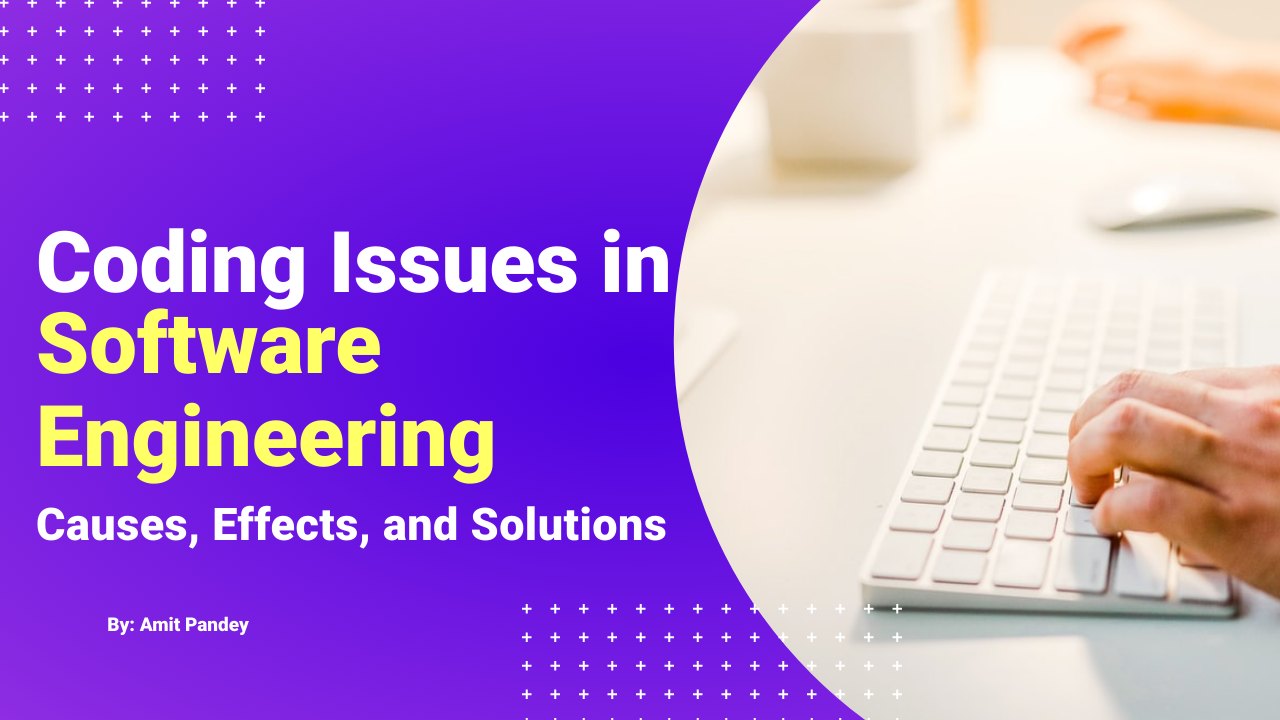Software engineering is a discipline that involves developing software applications using a systematic approach.
Software engineers follow a set of guidelines, best practices, and coding standards to ensure that the software they develop is reliable, maintainable, and scalable. However, coding issues can arise during the development process, which can affect the quality, performance, and security of the software.
In this article, we will explore some of the common coding issues in software engineering, their causes, effects, and solutions.
Coding Issues in Software Engineering
Software engineering involves developing software applications by following a systematic approach. As with any form of engineering, coding issues can arise during the development process. Some of the common coding issues in software engineering include:
- Syntax errors: These are errors that occur when the syntax of a programming language is not followed correctly. Syntax errors are usually identified by the compiler or interpreter and need to be corrected before the code can be executed.
- Logic errors: Logic errors occur when the code runs without any syntax errors, but the program does not produce the expected output. These errors can be difficult to find and fix, as the program may be functioning correctly, but the logic of the code is flawed.
- Runtime errors: These errors occur during the execution of the program, often due to invalid input or other unexpected conditions. These errors can cause the program to crash or behave unexpectedly.
- Security vulnerabilities: Security vulnerabilities are weaknesses in the code that can be exploited by attackers to gain unauthorized access to the system or data. These vulnerabilities can be caused by coding errors or poor design decisions.
- Performance issues: Performance issues occur when the program runs slower than expected, consumes too much memory or other system resources, or experiences other performance-related problems.
1. Syntax Errors
Syntax errors are coding issues that occur when the syntax of a programming language is not followed correctly. These errors can be caused by typos, missing semicolons, or incorrect use of parentheses or brackets. Syntax errors are usually identified by the compiler or interpreter and need to be corrected before the code can be executed.
Effects of Syntax Errors
Syntax errors can prevent the code from compiling or executing, which can lead to delays in the development process. They can also cause the software to behave unexpectedly or crash, which can affect the user experience and damage the reputation of the software.
Solutions for Syntax Errors
To avoid syntax errors, software engineers should use an Integrated Development Environment (IDE) that provides syntax highlighting, auto-completion, and other features that help detect syntax errors in real-time. They should also perform regular code reviews and use static code analysis tools to identify and fix syntax errors early in the development process.
2. Logic Errors
Logic errors are coding issues that occur when the code runs without any syntax errors, but the program does not produce the expected output. These errors can be caused by incorrect assumptions, incorrect use of variables, or flawed algorithms. Logic errors can be difficult to find and fix, as the program may be functioning correctly, but the logic of the code is flawed.
Effects of Logic Errors
Logic errors can cause the software to produce incorrect results or behave unexpectedly, which can affect the user experience and damage the reputation of the software. They can also lead to security vulnerabilities and data breaches, as attackers can exploit logic errors to gain unauthorized access to the system or data.
Solutions for Logic Errors
To avoid logic errors, software engineers should use a structured approach to software development, such as Object-Oriented Programming (OOP), that encourages modularization and encapsulation of code. They should also perform extensive testing and use debuggers and other tools to identify and fix logic errors early in the development process.
3. Runtime Errors
Runtime errors are coding issues that occur during the execution of the program, often due to invalid input or other unexpected conditions. These errors can cause the program to crash or behave unexpectedly.
Effects of Runtime Errors
Runtime errors can cause the software to crash, which can affect the user experience and damage the reputation of the software. They can also lead to security vulnerabilities and data breaches, as attackers can exploit runtime errors to gain unauthorized access to the system or data.
Solutions for Runtime Errors
To avoid runtime errors, software engineers should perform input validation and error handling in their code to handle unexpected conditions gracefully. They should also use tools like debuggers and exception handling mechanisms to identify and fix runtime errors early in the development process.
4. Security Vulnerabilities
Security vulnerabilities are coding issues that can be exploited by attackers to gain unauthorized access to the system or data. These vulnerabilities can be caused by coding errors or poor design decisions.
Effects of Security Vulnerabilities
Security vulnerabilities can lead to data breaches, theft of sensitive information, and other cyber attacks, which can damage the reputation of the software and the organization that developed it. They can also result in legal and financial consequences, as organizations may be liable for damages caused by security breaches.
Solutions for Security Vulnerabilities
To avoid security vulnerabilities, software engineers should follow secure coding practices and use security-focused tools like encryption, authentication, and access control mechanisms. They should also perform regular security audits and penetration testing to identify and address security vulnerabilities.
5. Performance Issues
Performance issues are coding issues that occur when the program runs slower than expected, consumes too much memory or other system resources, or experiences other performance-related problems. These issues can be caused by inefficient algorithms, poor database design, or other factors that affect the performance of the software.
Effects of Performance Issues
Performance issues can affect the user experience of the software, leading to dissatisfaction and a decrease in usage. They can also affect the scalability of the software, making it difficult to handle a large number of users or data. In extreme cases, performance issues can cause the software to crash or become unresponsive, leading to data loss or other negative consequences.
Solutions for Performance Issues
To avoid performance issues, software engineers should use efficient algorithms, optimize database queries, and use caching mechanisms to improve the performance of the software. They should also perform load testing and performance testing to identify and address performance issues early in the development process.
Conclusion
Coding issues are a common challenge faced by software engineers during the development process. These issues can affect the quality, performance, and security of the software, leading to negative consequences for the users and the organization that developed it.
To avoid coding issues, software engineers should follow best practices and coding standards, perform regular code reviews, and use tools like debuggers and static code analysis tools to identify and fix errors early in the development process.
By taking a proactive approach to coding issues, software engineers can develop high-quality, reliable, and secure software applications that meet the needs of their users.




Write a comment